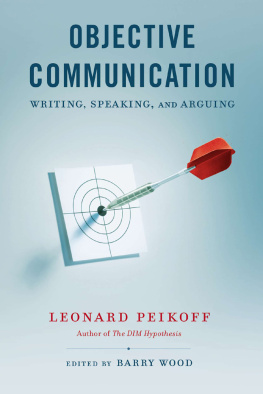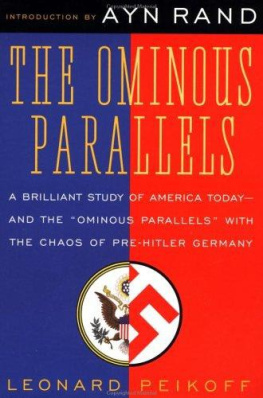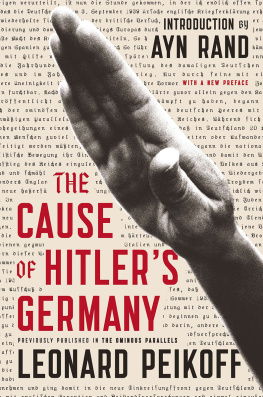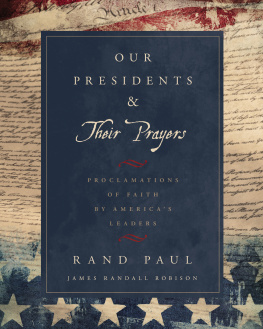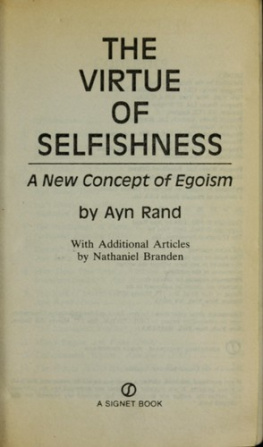
A N E W T E X T B O O K O F A M E R I C A N I S M
T H E P O L I T I C S O F A Y N R A N D
writing & commentary by
A Y N R A N D
with additional writings by
L E O N A R D P E I K O F F
&
A N D R E W B E R N S T E I N
H A R R Y B I N S WA N G E R
Y A R O N B R O O K
O N K A R G H A T E
S T U A R T K . H A Y A S H I
J O N A T H A N H O E N I G
E L A N J O U R N O
A M Y P E I K O F F
G R E G O R Y S A L M I E R I
R I C H A R D S A L S M A N
C . B R A D L E Y T H O M P S O N
D O N WA T K I N S
Edited by Jonathan Hoenig
2018, Jonathan Hoenig
All rights reserved. No part of this publication may be reproduced without the prior written permission of the publisher. Excerpts from Objectivist Workshop on Ethics and Politics appear courtesy of the Peikoff Family Trust.
Excerpts from Leonard Peikoffs works appear courtesy of Leonard Peikoff.
Capitalistpig Publications
POB 1658, Chicago, IL 60690-1658
capitalistpig.com
First printing, 2018
The publisher wishes to acknowledge:
The Ayn Rand Archives
Jocelyn Baker, Proofreader
Jeff Britting, Editorial Consultant
Stuart K. Hayashi, Assistant Publisher
Shoshana Milgram
Back cover image:
J. Paul Getty Trust. Photo courtesy of the Ayn Rand Archives Made in the U.S.A.
isbn-10: 0-692-93044-2 / isbn-13: 978-0-692-93044-1
Contents
vii Introduction
P A R T I A Y N R A N D ST E X T B O O K O F A M E R I C A N I S M
2 First Installment, May 1946
1. What Is the Basic Issue in the World Today?
2. What Is a Social System?
3. What Is the Basic Principle of America?
4 Second Installment, June 1946
4. What Is a Right?
5. What Are the Inalienable Rights of Man?
6. How Do We Recognize One Anothers Rights?
7. How Do We Determine That a Right Has Been Violated?
8. What Is the Proper Function of Government?
8 Third Installment, July 1946
9. Can There Be a Mixed Social System?
10. Can a Society Exist Without a Moral Principle?
11 Fourth Installment, October 1946
11. Is The Greatest Good For the Greatest Number
a Moral Principle?
12. Does the Motive Change the Nature of a Dictatorship?
iii
PA R T I I E X PA N D I N G T E X T B O O K O F A M E R I C A N I S M
Ayn Rands Original Textbook of Americanism Questions With Additional Answers Based on Ayn Rands Philosophy
On American Political Philosophy
Onkar Ghate
What Is Capitalism?
Isnt It the Governments Job to Enforce Both Individual Rights and the Public Interest?
What Is the Difference Between Economic Power
and Political Power?
Can We Do Good By Force?
What Is the Profit Motive?
Is Economic Competition Beneficial?
What Is the Meaning of the Law of Supply and Demand?
On Property Rights
Jonathan Hoenig
Would It Pay Us to Divide Great Fortunes?
What Is the Difference Between Cooperation and Compulsion?
On Freedom vs. Dictatorship
Andrew Bernstein
Is There Any Difference Between Communism and Fascism?
Does Capitalism Create Poverty?
Is Capitalism Efficient?
Are Dictatorships Efficient?
On Economics
Richard Salsman
How Are Fortunes Made in a Capitalist System?
What Is the Meaning of Production for Use
and Not for Profit?
Are Monopolies Created By Capitalism?
Can We Have Planning And Freedom at the Same Time?
iv
59 On Civil Rights
Amy Peikoff
Why Is Racial Prejudice Un-American?
Is There a Division Between Human Rights
and Property Rights?
Can Civil Rights Exist Without Property Rights?
69 On Welfare
Don Watkins
Can Charity Be a Right?
77 On the Role of Voting in the American System of GovernmentGregory Salmieri
87 On the Alt-Right
Stuart K. Hayashi
How to Recognize A Nazi?
93 On the Necessity and Efficacy of Principles
Leonard Peikoff
Do We Have to Be Consistent About Principles?
What Is the Relation Between Theory and Practice?
What Has Been the History of Human Progress?
P A R T I I I
105 Further Commentary By Ayn Rand: Excerpts From
Objectivist Workshop on Ethics and Politics
Ayn Rand
Is The Consent Of The Governed the Basis of
Government Authority?
What Power Do We Delegate to a Proper Government?
What Particular Class of Action?
When We Enter Into an Organized Society, Do We Lose the Right Objectively to Defend Ourselves?
Is There a Right to Secede?
v
Would Difference in Language Be a Valid Reason to Secede?
Should There Be a National Language?
Should Americans Reject the Conception of a World Government?
International Law and the Laws of War
Are Laws Which Anticipate Violence Proper?
Enforced Vaccination and Quarantine
PA R T I V A M E R I C A N I S M : A N E N D U R I N G P O L I T I C S
Textbook of AmericanismToday
Yaron Brook
Americanism and the Spirit of Liberty
C. Bradley Thompson
Buy American Is Un-American
Harry Binswanger
What Should a Distinctively American Foreign Policy Do?
Elan Journo
Capitalism as Secular
Leonard Peikoff
Notes
Index
Contributors
vi
Introduction
Most people, even most Americans, have no idea what the United States represents. Some will proclaim that the countrys defining and most virtuous trait is that it is a democracy, and that Americas essence, therefore, derives primarily from the power to vote. The more sophisticated person might reference the United States Constitution and the Declaration of Independence.
A significant number of Americans will insist that those two documents are the consistent implementation of Christianity; others will dismiss those very same documents by ascribing their authorship to white, landowning, patriarchal slaveholders.
Some people recognize that America was founded on the principle of freedom, but they will insist that less-free (even completely unfree) collectivist models of government, ranging from the regulatory-entitlement states of Scandinavia to the dictatorships of Russia and Cuba, count as morally legitimate alternatives. After all, they say, the Cuban government provides free
healthcare and Russians voted their leaders into office.
Most Americans and denizens of the West have never analyzed the principles on which America was founded, so they fail to see the republic in principled terms. Properly understood, individualismand its principle of individual rightsis the foundation of Americas unique politics.
One denizen of the Westa thinker who was an American by choicedid grasp Americas political essence down to its roots. In her 1974 address before the graduating class of the United States Military Academy at West Point, novelist-philosopher Ayn Rand spoke the following words: I can saynot as a patriotic bromide, but with a full knowledge of the necessary metaphysical, epistemological, ethical, political and esthetic rootsthat the United States of America is the greatest, the noblest and, in its original founding principles, the only moral country in the history of the world.1
Next page


